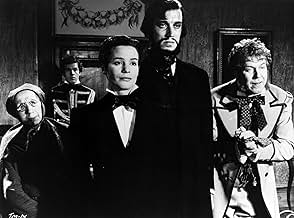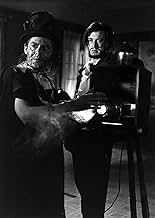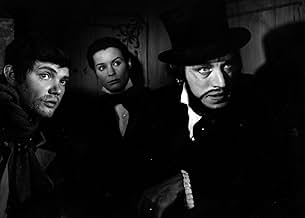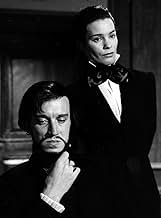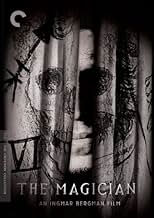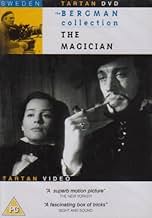VALUTAZIONE IMDb
7,5/10
11.588
LA TUA VALUTAZIONE
Un mago ed i suoi assistenti sono perseguitati dalle autorità nella Svezia del 19esimo secolo. La loro cattura, comunque, non porterebbe nessuna vittoria a coloro che detengono il potere.Un mago ed i suoi assistenti sono perseguitati dalle autorità nella Svezia del 19esimo secolo. La loro cattura, comunque, non porterebbe nessuna vittoria a coloro che detengono il potere.Un mago ed i suoi assistenti sono perseguitati dalle autorità nella Svezia del 19esimo secolo. La loro cattura, comunque, non porterebbe nessuna vittoria a coloro che detengono il potere.
- Nominato ai 1 BAFTA Award
- 3 vittorie e 2 candidature totali
Frithiof Bjärne
- Border Officer
- (non citato nei titoli originali)
Tor Borong
- Border Officer
- (non citato nei titoli originali)
Recensioni in evidenza
With the exception for the abrupt and somehow rushed and unsatisfying ending, "Magician" is a typical (in a good sense of the word) Bergman's film that I liked a lot. I would call it "The Tortured Soul of an Artist or Smiles of a Summer Night meets Hour of the Wolf." I did not know what to expect from the film and was pleasantly surprised by an interesting story; impressive (especially in the earlier scenes in the woods) black and white cinematography; perfect blend of humor, intense drama, and mystery. Acting was perfect - not a big surprise with the cast like that: Max von Sydow, Ingrid Thulin, Gunnar Björnstrand, Bibi Andersson, and Erland Josephson. I'd like to mention Naima Wifstrand as Granny Vogler - what a great actress and what a character - she stepped out from the pages of the fairy tales, the old witch, wise and powerful; she also provides many comical scenes.
7.5/10
7.5/10
Most of Ingmar Bergman's films are meant to titillate the intellect. The Magician is no exception. It is rich with symbolism. I think it ranks right up there with "Death in Venice" on the list of misunderstood movies.
I believe the most rewarding level of meaning in "The Magician" is the religious one. Bergman was often concerned with the implications of religious beliefs. And almost always from the attitude of doubt. Consider the lines in The Seventh Seal where the vicious monk, annoyed with the knight's persistence, asks, "Will you never stop asking questions?" and the knight replies resolutely, "No. Never."
Watching this movie with the idea of Vogler as Jesus provides a perspective that informs the characters and their conduct. This melancholy magician, doubted and persecuted by the powerful, surrounded by strange and suspicious persons, is simultaneously visionary and earthy flesh and blood. He only wants to perform his miracles for the masses. Or is he a charlatan? What a powerful way to pose that question.
I believe the most rewarding level of meaning in "The Magician" is the religious one. Bergman was often concerned with the implications of religious beliefs. And almost always from the attitude of doubt. Consider the lines in The Seventh Seal where the vicious monk, annoyed with the knight's persistence, asks, "Will you never stop asking questions?" and the knight replies resolutely, "No. Never."
Watching this movie with the idea of Vogler as Jesus provides a perspective that informs the characters and their conduct. This melancholy magician, doubted and persecuted by the powerful, surrounded by strange and suspicious persons, is simultaneously visionary and earthy flesh and blood. He only wants to perform his miracles for the masses. Or is he a charlatan? What a powerful way to pose that question.
Many people may have missed the satisfaction of reading the extra layer of meaning in this film: that the "magician" is the the filmmaker or visa versa, in this case Bergman himself. Without giving anything of the plot away, I can say that The Magician is a reflection on Bergamn's role as a creator of illusions. He uses the story of a roving theatrical troupe with an magician to illuminate the metaphor. The apparently abrupt turn of events at the end is Bergman's signal that he is the master of your perceptions in this medium, that he compares to the experience of dreaming.
It is interesting to compare this film with Fellini's 8 1/2, another filmmaker's reflection on the process and meaning of film-making. Two very different sensibilities are at work in these two films, but with surprisingly close parallels in their endings, and involuted plots.
I found this film highly satisfying on many levels, even taken at its apparent face value, as a romp. Seen a second time the illusionist begins to emerge more clearly, from the moment the film opens, with the lighting of the arc lamp of a film projector.
It is interesting to compare this film with Fellini's 8 1/2, another filmmaker's reflection on the process and meaning of film-making. Two very different sensibilities are at work in these two films, but with surprisingly close parallels in their endings, and involuted plots.
I found this film highly satisfying on many levels, even taken at its apparent face value, as a romp. Seen a second time the illusionist begins to emerge more clearly, from the moment the film opens, with the lighting of the arc lamp of a film projector.
Everybody wants to believe, born into a world that constantly deceives, that magic is real, as we make a deal, with an agent that death's door conceals - or at least that was the case in ages past when such beliefs were seared into you from birth.
Don't be fooled by what you see, the customs, costumes distract thee, a grand façade to suck you in, from birth, controlled, conditioning.
The illusions that confuse and abuse perfectly encapsulated in a magical and mesmerising piece of cinema that merits repeated reviewing, and why wouldn't you with several Bergman stalwarts performing to their absolute best, and some.
Don't be fooled by what you see, the customs, costumes distract thee, a grand façade to suck you in, from birth, controlled, conditioning.
The illusions that confuse and abuse perfectly encapsulated in a magical and mesmerising piece of cinema that merits repeated reviewing, and why wouldn't you with several Bergman stalwarts performing to their absolute best, and some.
I've seen a lot of Ingmar Bergman films and sometimes I don't want to see one of his films about death or mental illness. Well, starting in the 1960s to the 1980s, these were the main themes of his movies, but in some of his earlier films, these are not so pervasive--such as the movies The Devil's Eye (a comedy) and The Magician ("Ansiktet"). Because of this, they may be more approachable to the average viewer who would balk at the much more serious tone of such classics as Through a Glass Darkly (deep depression), Persona (mental illness), Autumn Sonata (repressed anger and abandonment), The Seventh Seal (death and the plague) or Fanny and Alexander (child abuse and emotional neglect).
The story is about a traveling group of hoaxters who put on a show combining magic and "animal magnetism" (i.e., an early name given to hypnosis). When they arrive at a Swedish town, they are forced to come to an audience with the local official and his cronies who want to prove that the act is a fraud. Bergman really doesn't try to resolve this issue, but instead shows how the town officials are really rather petty and mean people. How this traveling group deftly survives this encounter is the main focus of the movie. I especially liked the portion of the movie about the autopsy. It sounds gross, but I thought it was actually kind of funny. One of the officials is a cold and rather nasty doctor who longs for a chance to do an autopsy on the hypnotist. He gets far more than he bargains for--that's all I really want to say--otherwise it might ruin the suspense.
So, overall I liked the movie. It was not great but well acted and not the least bit depressing.
The story is about a traveling group of hoaxters who put on a show combining magic and "animal magnetism" (i.e., an early name given to hypnosis). When they arrive at a Swedish town, they are forced to come to an audience with the local official and his cronies who want to prove that the act is a fraud. Bergman really doesn't try to resolve this issue, but instead shows how the town officials are really rather petty and mean people. How this traveling group deftly survives this encounter is the main focus of the movie. I especially liked the portion of the movie about the autopsy. It sounds gross, but I thought it was actually kind of funny. One of the officials is a cold and rather nasty doctor who longs for a chance to do an autopsy on the hypnotist. He gets far more than he bargains for--that's all I really want to say--otherwise it might ruin the suspense.
So, overall I liked the movie. It was not great but well acted and not the least bit depressing.
Lo sapevi?
- QuizThe character of Vogler was based on Bergman himself.
- Blooper(at about 13 mins) When Tubal gets on in a carriage, a policeman hangs outside the carriage door but in the very next shot, the policeman is again seen to hang on the same door.
- Citazioni
Dr. Vergerus, Minister of Health: Either this is a dream or I'm losing my mind. Since It's inconceivable that I've lost all reason, I'll just wait till I wake up.
- ConnessioniFeatured in Premio Donostia a Max Von Sydow (2006)
I più visti
Accedi per valutare e creare un elenco di titoli salvati per ottenere consigli personalizzati
- How long is The Magician?Powered by Alexa
Dettagli
- Tempo di esecuzione
- 1h 41min(101 min)
- Colore
- Mix di suoni
- Proporzioni
- 1.33 : 1
Contribuisci a questa pagina
Suggerisci una modifica o aggiungi i contenuti mancanti

